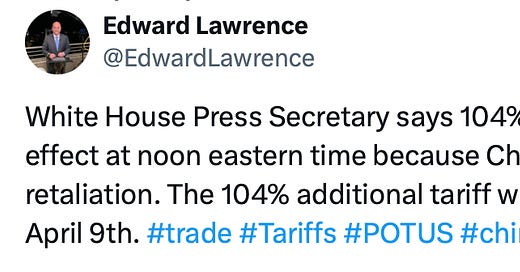We have breaking news right now. In a dramatic escalation of the ongoing trade dispute between the United States and China, the White House has confirmed that starting at 12:00 AM ET tomorrow morning, an additional 104% tariff on Chinese imports will go into effect.
This move, reported by Fox News, comes in response to China's refusal to remove its existing 34% tariff on U.S. goods. Karoline Leavitt has confirmed that collection will begin tomorrow on the tariffs.
I am working around the clock to make sure you are the first to know when news breaks. Please consider supporting my work by becoming a paid subscriber today:
The U.S.-China trade war, which began in earnest under the Trump administration, has continued to shape economic relations between the two global superpowers. Despite efforts to ease tensions through trade negotiations and periodic agreements, significant obstacles remain. One of the key sticking points in these negotiations has been the issue of tariffs. While both sides have taken steps to reduce or adjust tariffs over time, the economic friction caused by these duties has not been resolved.
For the United States, the imposition of tariffs on Chinese goods was intended to address trade imbalances, protect American intellectual property, and challenge what was seen as unfair trade practices. On the other side, China implemented retaliatory tariffs on U.S. products in an attempt to balance the scales. The 34% tariff China placed on U.S. goods, which remains in place, has been a central element of this conflict.
The decision to impose a staggering 104% additional tariff on Chinese imports comes as a direct response to China's ongoing refusal to remove its 34% tariff on U.S. products. According to the White House, the additional tariffs are not only a means to address economic inequality but also a signal to China that the United States will not tolerate what it perceives as unfair trade practices.
The imposition of such a steep tariff is likely to reverberate across the global economy. Analysts predict that this move will further strain the U.S.-China relationship and may lead to increased prices for goods in the U.S., especially for industries that rely on Chinese manufacturing. Some sectors, such as technology and consumer electronics, could be particularly hard hit, as China is a key supplier of components for products ranging from smartphones to computer chips.
While the White House is positioning the tariffs as a necessary step to combat China's unfair trade practices, critics argue that the additional duties will do little to resolve the underlying issues. In fact, they warn that such aggressive actions may escalate the conflict, causing more harm than good for both American consumers and businesses.
International markets are also expected to feel the pressure as trade disruptions become more pronounced. Some economists fear that this latest round of tariffs could lead to higher global inflation, particularly in the areas of manufacturing and consumer goods, as well as contribute to greater uncertainty in the global financial markets.
In the coming weeks, we can expect continued scrutiny of U.S.-China relations, as well as increased calls for both sides to return to the negotiating table. However, with tensions at an all-time high, it remains to be seen how this trade war will evolve and what impact it will have on the broader geopolitical landscape.





It's a crazy time right now, and just wanted to say thank you for your support. I am on the road, but making sure you have news right away. Special thank you to the paid subscribers and those who have sent one time donations via Venmo (Aaron-parnas).
I guess this is what happens when you put a giant toddler in the fucking White House